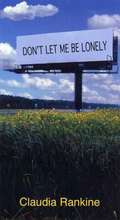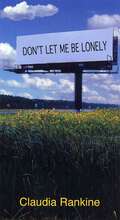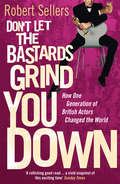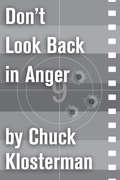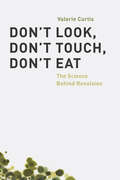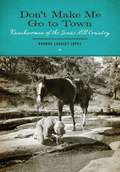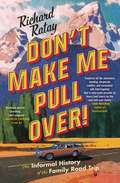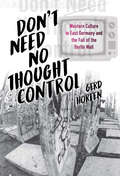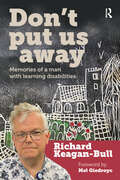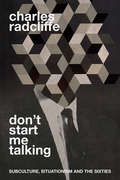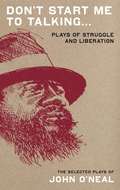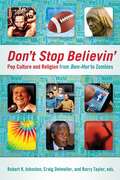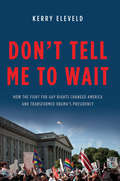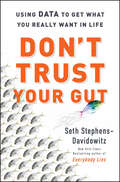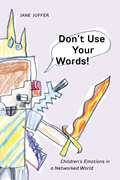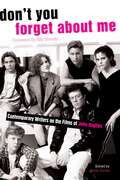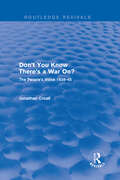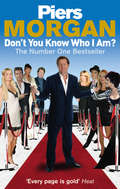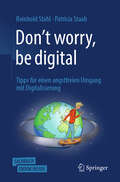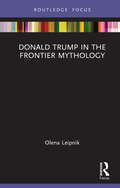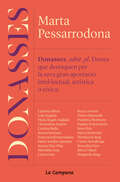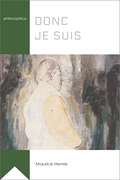- Table View
- List View
Don't Let Me Be Lonely: An American Lyric
by Claudia RankineDon't Let Me Be Lonely is an important new confrontation with our culture, with a voice at its heart bewildered by its inadequacy in the face of race riots, terrorist attacks, medicated depression, and the antagonism of the television that won't leave us alone.
Don't Let Me Be Lonely: An American Lyric
by Claudia RankineA brilliant and unsparing examination of America in the early twenty-first century, Claudia Rankine’s Don’t Let Me Be Lonely invents a new genre to confront the particular loneliness and rapacious assault on selfhood that our media have inflicted upon our lives. Fusing the lyric, the essay, and the visual, Rankine negotiates the enduring anxieties of medicated depression, race riots, divisive elections, terrorist attacks, and ongoing wars—doom scrolling through the daily news feeds that keep us glued to our screens and that have come to define our age.First published in 2004, Don’t Let Me Be Lonely is a hauntingly prescient work, one that has secured a permanent place in American literature. This new edition is presented in full color with updated visuals and text, including a new preface by the author, and matches the composition of Rankine’s best-selling and award-winning Citizen and Just Us as the first book in her acclaimed American trilogy.Don’t Let Me Be Lonely is a crucial guide to surviving a fractured and fracturing American consciousness—a book of rare and vital honesty, complexity, and presence.
Don't Let the Bastards Grind You Down: How One Generation of British Actors Changed the World
by Robert SellersAlan Bates, Michael Caine, Sean Connery, Tom Courtenay, Albert Finney, Richard Harris, Peter O'Toole, Robert Shaw and Terence Stamp: They are the most formidable acting generation ever to tread the boards or stare into a camera, whose anti-establishment attitude changed the cultural landscape of Britain.This was a new breed, many culled from the working class industrial towns of Britain, and nothing like them has been seen before or since. Their raw earthy brilliance brought realism to a whole range of groundbreaking theatre from John Osborne's Look Back in Anger to Joan Littlewood and Harold Pinter and the creation of the National Theatre. And they ripped apart the staid, middle-class British film industry with kitchen-sink classics like Saturday Night and Sunday Morning, This Sporting Life, The Loneliness of the Long Distance Runner, A Kind of Loving and Billy Liar before turning their sights on international stardom: Connery with James Bond, O'Toole as Lawrence of Arabia, Finney with Tom Jones and Caine in Zulu.Don't Let the Bastards Grind You Down brings alive the trail-blazing period of theatre and film from 1956-1964 through the vibrant energy and exploits of this revolutionary generation of stars who bulldozed over austerity Britain and paved the way for the swinging 60s. What Peter Biskind's Easy Riders Raging Bulls did for American cinema writing so Don't Let the Bastards will do for the British cinema.
Don't Look Back in Anger
by Chuck KlostermanOriginally collected in Chuck Klosterman IV and now available both as a stand-alone essay and in the ebook collection Chuck Klosterman on Film and Television, this essay is about The Wonder Years.
Don't Look, Don't Touch, Don't Eat: The Science Behind Revulsion
by Valerie CurtisA scientist delves into what disgusts us and why: “For a book riddled with rancid and revolting things, [it] is surprisingly difficult to put down.” —Times Literary SupplementEvery flu season, sneezing, coughing, and graphic throat-clearing become background noise in workplaces. And coworkers tend to move as far—and as quickly—away from the source of these bodily eruptions as possible. Instinctively, humans recoil from objects that they view as dirty and even struggle to overcome feelings of discomfort once the offending item has been cleaned. These reactions are universal, and although there are cultural and individual variations, by and large we are all disgusted by the same things.In this book, Valerie Curtis builds a strong case for disgust as a “shadow emotion”—less familiar than love or sadness, it nevertheless affects our day-to-day lives. In disgust, biological and sociocultural factors meet in dynamic ways to shape human and animal behavior. Curtis traces the evolutionary role of disgust in disease prevention and hygiene, but also shows that it is much more than a biological mechanism. Human social norms, from good manners to moral behavior, are deeply rooted in our sense of disgust. The disgust reaction informs both our political opinions and our darkest tendencies, such as misogyny and racism. Through a deeper understanding of disgust, Curtis argues, we can take this ubiquitous human emotion and direct it towards useful ends, from combating prejudice to reducing disease.“Curtis, one of the deepest thinkers and cleverest researchers on this part of human nature, turns revulsion into fascination.” —Steven Pinker“Great fun.” —Toronto Star
Don't Make Me Go to Town
by Rhonda Lashley LopezMany people dream of "someday buying a small quaint place in the country, to own two cows and watch the birds," in the words of Texas ranchwoman Amanda Spenrath Geistweidt. But only a few are cut out for the unrelenting work that makes a family ranching operation successful. Don't Make Me Go to Town presents an eloquent photo-documentary of eight women who have chosen to make ranching in the Texas Hill Country their way of life. Ranging from young mothers to elderly grandmothers, these women offer vivid accounts of raising livestock in a rugged land, cut off from amenities and amusements that most people take for granted, and loving the hard lives they've chosen. Rhonda Lashley Lopez began making photographic portraits of Texas Hill Country ranchwomen in 1993 and has followed their lives through the intervening years. She presents their stories through her images and the women's own words, listening in as the ranchwomen describe the pleasures and difficulties of raising sheep, Angora goats, and cattle on the Edwards Plateau west of Austin and north of San Antonio. Their stories record the struggles that all ranchers face-vagaries of weather and livestock markets, among them-as well as the extra challenges of being women raising families and keeping things going on the home front while also riding the range. Yet, to a woman, they all passionately embrace family ranching as a way of life and describe their efforts to pass it on to future generations.
Don't Make Me Pull Over!: An Informal History of the Family Road Trip
by Richard Ratay&“A lighthearted, entertaining trip down Memory Lane&” (Kirkus Reviews), Don&’t Make Me Pull Over! offers a nostalgic look at the golden age of family road trips—before portable DVD players, smartphones, and Google Maps.The birth of America&’s first interstate highways in the 1950s hit the gas pedal on the road trip phenomenon and families were soon streaming—sans seatbelts!—to a range of sometimes stirring, sometimes wacky locations. In the days before cheap air travel, families didn&’t so much take vacations as survive them. Between home and destination lay thousands of miles and dozens of annoyances, and with his family Richard Ratay experienced all of them—from being crowded into the backseat with noogie-happy older brothers, to picking out a souvenir only to find that a better one might have been had at the next attraction, to dealing with a dad who didn&’t believe in bathroom breaks. Now, decades later, Ratay offers &“an amiable guide…fun and informative&” (New York Newsday) that &“goes down like a cold lemonade on a hot summer&’s day&” (The Wall Street Journal). In hundreds of amusing ways, he reminds us of what once made the Great American Family Road Trip so great, including twenty-foot &“land yachts,&” oasis-like Holiday Inn &“Holidomes,&” &“Smokey&”-spotting Fuzzbusters, twenty-eight glorious flavors of Howard Johnson&’s ice cream, and the thrill of finding a &“good buddy&” on the CB radio. An &“informative, often hilarious family narrative [that] perfectly captures the love-hate relationship many have with road trips&” (Publishers Weekly), Don&’t Make Me Pull Over! reveals how the family road trip came to be, how its evolution mirrored the country&’s, and why those magical journeys that once brought families together—for better and worse—have largely disappeared.
Don't Need No Thought Control: Western Culture in East Germany and the Fall of the Berlin Wall
by Gerd HortenThe fall of the Berlin Wall is typically understood as the culmination of political-economic trends that fatally weakened the East German state. Meanwhile, comparatively little attention has been paid to the cultural dimension of these dramatic events, particularly the role played by Western mass media and consumer culture. With a focus on the 1970s and 1980s, Don’t Need No Thought Control explores the dynamic interplay of popular unrest, intensifying economic crises, and cultural policies under Erich Honecker. It shows how the widespread influence of (and public demands for) Western cultural products forced GDR leaders into a series of grudging accommodations that undermined state power to a hitherto underappreciated extent.
Don't Need No Thought Control: Western Culture in East Germany and the Fall of the Berlin Wall
by Gerd HortenThe fall of the Berlin Wall is typically understood as the culmination of political-economic trends that fatally weakened the East German state. Meanwhile, comparatively little attention has been paid to the cultural dimension of these dramatic events, particularly the role played by Western mass media and consumer culture. With a focus on the 1970s and 1980s, Don’t Need No Thought Control explores the dynamic interplay of popular unrest, intensifying economic crises, and cultural policies under Erich Honecker. It shows how the widespread influence of (and public demands for) Western cultural products forced GDR leaders into a series of grudging accommodations that undermined state power to a hitherto underappreciated extent.
Don't Put Us Away: Memories of a Man with Learning Disabilities
by Richard Keagan-BullA unique, honest and powerful account of what it is like to grow up with learning disabilities in the UK. An ordinary man has written an extraordinary book. Richard Keagan-Bull has learning disabilities. He struggles to read and write, but he has dictated his life story to his friend-turned-secretary Hazel Bradley. It is written exactly as he speaks – not necessarily grammatically correct, but with a unique directness and power.Richard tells the story of growing up in 1970s England and living through the decades where people with learning disabilities were increasingly given a voice. It is a story of finding your place in a world that is not always welcoming, but also of finding friends. Starting with his birth when his mother was told he would never do anything, and his early years, when he was rubbished by the headmaster who threw his schoolwork out of the window, he ends his book almost half a century later, when the boy who would never do anything landed a job at a university as a researcher. Chapters include details of his years living in the L’Arche community, where he found real friends and a sense of belonging. He has travelled the world in his role as self-advocate and reflects on the place of people with learning disabilities everywhere.This book is unique and important because it is written so clearly and entirely from an insider’s perspective. Richard writes about serious subjects with a very light touch. His book is simultaneously funny and profound. It will be of interest to anyone who wishes to gain an extremely rare insight into the life of a person with learning disabilities, in a voice that is so completely his own.This is an honest and at times poignant book filled with humour. Richard’s stories of love and international travel, of finding meaningful work and true belonging are gripping. I couldn’t put it down…Baroness Sheila Hollins
Don't Start Me Talking: Subculture, Situationism and the Sixties
by Charles RadcliffeIn his seminal socio history of Punk, “England’s Dreaming”, Jon Savage makes the bald assertion that “Charles Radcliffe laid the foundation for the next twenty years of sub-cultural theory”, referring in particular to his 1966 piece “the Seeds of Social Destruction’ that appeared in the first of two issues of Radcliffe’s co authored, insurrectionary street-zine, ‘Heatwave’ . Teddy Boys, Ton Up Kids, Mods and Rockers, Beats, Ban the Bombers,The Ravers ( jazz heads) : Radcliffe argued that the bank holiday bust ups, the demos, the riots, the sex drugs n rock n’ roll, these were all part of a “youth revolt… (that ) has left a permanent mark on this society, has challenged assumptions and status, and been prepared to vomit its’ disgust in the streets. The youth revolt has not always been comfortable, valid, to the point or helpful. It has however made its first stumbling political gestures with an immediacy that revolutionaries should not deny, but envy.” Radcliffe joined the International Situationists within the year, alongside (English founder ) Chris Gray, but by the time 1968 had ended, and youthful revolt had fed into wide pockets of political turmoil globally, Radcliffe had started to drift towards other poles of late 60s’s counterculture. He ended the 60’s in long hair and loon pants, banged up in a Belgian prison on hash smuggling charges. This epic ( 900 + pages) book follows Radcliffes’ trials and tribulations from public school beginnings, into the 60’s underground and the Mr Nice style large scale hash smuggling years (his friend, Howard Marks, pops up throughout) , on to prison, divorce, remarriage and beyond. It offers up important first hand perspectives on 60’s / 70’s counterculture, and an intimate portrait of a man who seemed to face the slings and arrows that fortune threw at him with a never ending supply of equanimity. And high grade hash.
Don't Start Me To Talking . . .: The Selected Plays
by John O'Neal"Nearly five decades of on-the-job training have equipped O'Neal with the skills and charm of a master storyteller."--The Drama Review "A dramatic tale spinner with a canny sense of humor and a winning, engaging stage presence. . . . O'Neal's shows mix folksiness, a sophisticated sense of theatricality and astute observation that are a pleasure to watch."--The Philadelphia Inquirer Artist and activist John M. O'Neal is best known for his Junebug Jabbo Jones cycle of plays, a remarkable collection of tales and anecdotes drawn from African American oral literature, which he has performed all over the globe. Four of these plays are included in this volume, along with four of O'Neal's other works: large-scale ensemble productions, first performed by his ensemble company Junebug Productions, as well as in collaboration with A Travelling Jewish Theater (San Francisco, California), Roadside Theater (Kentucky), and Pregones Theater (Bronx, New York). John M. O'Neal co-founded the Free Southern Theater in 1963 as a cultural arm of the southern Civil Rights movement, as well as Junebug Productions, a professional African American arts organization in New Orleans. For FST, O'Neal worked as a field director for the Student Non-Violent Coordinating Committee and worked as national field program director with the Committee for Racial Justice. He has written eighteen plays, a musical comedy, poetry, and several essays, and has performed throughout the United States, Canada, France, and Scandinavia. He is the recipient of the Award of Merit from the Association of Performing Arts Presenters, the United States Artists Award, and a Ford Foundation Award.
Don't Stop Believin'
by Robert K. Johnston Craig Detweiler Barry TaylorElvis Presley. Andy Warhol. Nike. Stephen King. Ellen DeGeneres. Sim City. Facebook. These American pop culture icons are just a few examples of entries you will find in this fascinating guide to religion and popular culture. Arranged chronologically from 1950 to the present, this accessible work explores the theological themes in 101 well-established figures and trends from film, television, video games, music, sports, art, fashion, and literature. This book is ideal for anyone who has an interest in popular culture and its impact on our spiritual lives. Contributors include such experts in the field as David Dark, Mark I. Pinsky, Lisa Swain, Steve Turner, Lauren Winner, and more.
Don't Tell Me to Wait: How the Fight for Gay Rights Changed America and Transformed Obama's Presidency
by Kerry EleveldAs a candidate in 2008, Barack Obama distanced himself from same-sex marriage, saying he believed marriage was “a sacred union” between a man and a woman. In 2012, he did just the opposite, proclaiming it was “important” for him to affirm the right of same-sex couples to marry. This dramatic about-face put the most powerful man in the world at the front of the battle for gay rights, giving LGBT Americans and their advocates an invaluable ally in their struggle for freedom. Just one year later, the Supreme Court would strike down key provisions of the Defense of Marriage Act, and no Democratic presidential nominee would ever again shun marriage equality. As former Advocate journalist Kerry Eleveld shows, Obama’s support transformed the issue of gay rights from a political liability into an electoral imperative, and in Don't Tell Me to Wait she offers a boots-on-the-ground account of how gay rights activists pushed the president to this political tipping point. Obama’s “evolution” on marriage equality was not the result of a benevolent politician who entered the Oval Office with a wealth of good intentions. Rather, pressure from lesbian, gay, bisexual, and transgender activists changed the conversation, issue by issue. As a result of the protests and outcry following the passage of California’s same-sex marriage ban, Obama realized that overturning the military’s “Don’t Ask, Don’t Tell” policy was the one 2008 campaign promise he couldn’t ignore. While pledges to other progressive constituencies fell apart during Obama’s first two years in office, the LGBT rights movement protested the administration’s fecklessness early and often. By the time the sun set on the 111th Congress, the “Don’t Ask, Don’t Tell” repeal had become the sole piece of major progressive legislation to become law. The repeal’s overwhelming success and popularity paved the way for other LGBT advances, including the president’s eventual embrace of the freedom to marry. With unprecedented access and unparalleled insights into this hot-button issue, Don't Tell Me to Wait captures a critical moment in LGBT history and demonstrates the power of activism to change the course of a presidency—and a nation.
Don't Trust Your Gut: Using Data to Get What You Really Want in LIfe
by Seth Stephens-Davidowitz"Seth Stephens-Davidowitz is more than a data scientist. He is a prophet for how to use the data revolution to reimagine your life. Don’t Trust Your Gut is a tour de force—an intoxicating blend of analysis, humor, and humanity.” — Daniel H. Pink, #1 New York Times bestselling author of When, Drive, and To Sell Is HumanBig decisions are hard. We consult friends and family, make sense of confusing “expert” advice online, maybe we read a self-help book to guide us. In the end, we usually just do what feels right, pursuing high stakes self-improvement—such as who we marry, how to date, where to live, what makes us happy—based solely on what our gut instinct tells us. But what if our gut is wrong? Biased, unpredictable, and misinformed, our gut, it turns out, is not all that reliable. And data can prove this.In Don’t Trust Your Gut, economist, former Google data scientist, and New York Times bestselling author Seth Stephens-Davidowitz reveals just how wrong we really are when it comes to improving our own lives. In the past decade, scholars have mined enormous datasets to find remarkable new approaches to life’s biggest self-help puzzles. Data from hundreds of thousands of dating profiles have revealed surprising successful strategies to get a date; data from hundreds of millions of tax records have uncovered the best places to raise children; data from millions of career trajectories have found previously unknown reasons why some rise to the top.Telling fascinating, unexpected stories with these numbers and the latest big data research, Stephens-Davidowitz exposes that, while we often think we know how to better ourselves, the numbers disagree. Hard facts and figures consistently contradict our instincts and demonstrate self-help that actually works—whether it involves the best time in life to start a business or how happy it actually makes us to skip a friend’s birthday party for a night of Netflix on the couch. From the boring careers that produce the most wealth, to the old-school, data-backed relationship advice so well-worn it’s become a literal joke, he unearths the startling conclusions that the right data can teach us about who we are and what will make our lives better.Lively, engrossing, and provocative, the end result opens up a new world of self-improvement made possible with massive troves of data. Packed with fresh, entertaining insights, Don’t Trust Your Gut redefines how to tackle our most consequential choices, one that hacks the market inefficiencies of life and leads us to make smarter decisions about how to improve our lives. Because in the end, the numbers don’t lie.
Don't Use Your Words!: Children's Emotions in a Networked World
by Jane JufferHow children are taught to control their feelings and how they resistthis emotional management through cultural production.Today, even young kids talk to each other across social media by referencing memes,songs, and movements, constructing a common vernacular that resists parental, educational, and media imperatives to name their feelings and thus control their bodies. Over the past two decades, children’s television programming has provided a therapeutic site for the processing of emotions such as anger, but in doing so has enforced normative structures of feeling that, Jane Juffer argues, weaken the intensity and range of children’s affective experiences.Don’t Use Your Words! seeks to challenge those norms, highlighting the ways that kids express their feelings through cultural productions including drawings, fan art, memes, YouTube videos, dance moves, and conversations while gaming online. Focusing on kids between ages five and nine, Don’t Use Your Words! situates these productions in specific contexts, including immigration policy referenced in drawings by Central American children just released from detention centers and electoral politics as contested in kids’ artwork expressing their anger at Trump’s victory. Taking issue with the mainstream tendency to speak on behalf of children, Juffer argues that kids have the agency to answer for themselves: what does it feel like to be a kid?
Don't You Forget About Me: Contemporary Writers on the Films of John Hughes
by Jaime ClarkeNo one captured the teen portion of the eighties as poignantly as writer-director John Hughes. Sixteen Candles, The Breakfast Club, Weird Science, Pretty in Pink, Ferris Bueller's Day Off, and Some Kind of Wonderful are timeless tales of love, angst, longing, and self-discovery that illuminated and assuaged the anxieties of an entire generation. Fondly nostalgic, filled with wit and surprising insights, don't you forget about me contains original essays from a skillfully chosen crop of novelists and essayists on the films' far-reaching effects on their own lives -- an irresistible read for anyone who came of age in the eighties (or just wishes they did). Featuring new writing from: Steve Almond * Julianna Baggott * Lisa Borders * Ryan Boudinot * T Cooper * Quinn Dalton * Emily Franklin * Lisa Gabriele * Tod Goldberg * Nina de Gramont * Tara Ison * Allison Lynn * John McNally * Dan Pope * Lewis Robinson * Ben Schrank * Elizabeth Searle * Mary Sullivan * Rebecca Wolff * Moon Unit Zappa
Don't You Know There's a War On?: The People's Voice 1939-45 (Routledge Revivals)
by Jonathan CroallWas the country really united in the face of the common enemy? Did people actually put the community’s needs before their own? Or were such ideas simply a series of myths created at the time and nurtured ever since. The recollections of this book, first published in 1989, attempt to answer such questions by evoking the reality of life on the home front during the war years. Here is a uniquely personal portrait of a nation at war, extensively illustrated with photographs, diaries, letters, poems, and other memorabilia belonging to the men and women whose wartime lives fill this absorbing book. This title will be of interest to students of history.
Don't You Know Who I Am?: Insider Diaries of Fame, Power and Naked Ambition
by Piers Morgan'They say you can always remember where you where when pivotal moments happen, such as losing your virginity or Elvis dying. Let me add another to the list: the moment I sang a duet to the the "Macarena" with Timmy Mallett, live to millions of people...'Sacked from his high-profile job as a national newspaper editor, Piers Morgan dived helplessly into the world of celebrity. But even twenty years of commenting on the lives of the rich and famous couldn't prepare him for the extraordinary world he uncovered...A riveting, scandelous and brutally honest account of one man's quest for celebrity, Don't You Know Who I Am? lifts the lid on the egos and outrageous behaviour of everyone from Paris Hilton to Cherie Blair, Kate Moss to the legend that is the Hoff.
Don't worry, be digital: Tipps für einen angstfreien Umgang mit Digitalisierung
by Reinhold Stahl Patricia StaabFühlen Sie sich überfordert angesichts der vielen Informationen, Meinungen und Unterhaltungsangebote im Internet? Ist Ihnen die zunehmende Digitalisierung in allen Lebensbereichen manchmal eher unheimlich? Überlegen Sie, wie weit Sie dabei mitmachen sollen? Dieses Buch lädt Sie ein, entspannt(er) mit dem technischen Fortschritt umzugehen. Die Digitalisierung macht unser Leben an vielen Stellen leichter, vielfältiger und sicherer: Heute können wir so leicht wie nie zuvor mit Leuten aus allen Ecken der Welt kommunizieren. Dank der vielen elektronischen Hilfen ist Autofahren sicherer denn je geworden und elektronische Helfer nehmen uns inzwischen viele lästige Arbeiten ab. Unterhaltsam und mit hilfreichen Tipps und einer positiven Grundhaltung gehen die Autoren auf verschiedene Lebensbereiche ein. Sie erläutern anschaulich, wie sich die digitale Entwicklung auf unseren Alltag auswirkt, und geben Tipps, wie man angstfrei damit umgehen kann. Von A wie Arbeiten über G wie Gesundheit und K wie Künstliche Intelligenz bis Z wie Zahlungsmittel finden Sie hier Informationen zu zahlreichen Themen des Lebens und der Digitalisierung. Aber auch die Risiken und Nebenwirkungen bleiben nicht unerwähnt. Die Autoren greifen Beispiele aus der Tagespresse auf und geben Hinweise für den sorgfältigen Umgang mit Sozialen Medien, persönlichen Daten und „Fake News“. Dabei bleibt der Text immer verständlich und illustriert mit Geschichten und Zeichnungen, statt Sie mit Statistiken zu überladen.
Donald Shebib's 'Goin' Down the Road'
by Geoff PevereSince its release in July 1970, Donald Shebib's low-budget road movie about displaced Maritimers in Toronto has become one of the most celebrated Canadian movies ever made. In this study of Goin' Down the Road, renowned film critic Geoff Pevere provides an engaging account of how a film produced under largely improvised circumstances became the most influential Canadian movie of its day as well as an enduring cultural touchstone.Featuring extensive interviews with the film's key participants, Pevere provides behind-the-scenes history and explores how the movie's meaning and interpretation have changed over time. He gives special attention to the question of why the film's creative mix of documentary techniques, road movie tropes, and social commentary have proven so popular and influential in Canadian filmmaking for decades.
Donald Trump in the Frontier Mythology (Routledge Studies in Media, Communication, and Politics)
by Olena LeipnikThis book explores the presidential image of Donald Trump as it is constructed by the media within American national mythology, precisely the frontier myth. By offering an account of three milestones in the development of the frontier mythology in its intersection with presidential imagery, the book shows how the image of Donald Trump fits into the line of "cowboy presidents," together with Theodore Roosevelt and Ronald Reagan. It also offers insights into the reasons for making Russian president Vladimir Putin a part of Trump’s story and a routinely mentioned figure in American presidential politics. Applying the means of philosophical anthropology to this topical issue at the intersection of politics and the media, this volume will appeal to those working and studying in the areas of media studies, political anthropology, American studies, and myth studies.
Donald Winnicott and the Politics of Care (Studies in the Psychosocial)
by Joanna KellondThis book explores the significance of psychoanalyst Donald Winnicott’s ideas for contemporary debates about care. Locating Winnicott in relation to a range of fields, including psychology, philosophy, sociology, critical theory and feminist theory, it examines the implications of his thinking for understanding and transforming the relationship between care and society. Winnicott was unique amongst psychoanalysts for the emphasis he placed on care in the development of subjectivity. The book unpacks Winnicott’s understanding of care and assesses its relevance for conceptions of social responsibility, justice and transformation. In a world where care is in crisis, how might we theorise the conditions necessary for the development of caring subjectivities, and is it possible to infer a relationship between those conditions and progressive social change? This unique book will be of interest to readers in psychosocial studies, politics and anyone concerned with thinking about the relationship between care and social transformation.
Donasses: Vint-i-dues dones de pes, protagonistes de la Catalunya moderna
by Marta PessarrodonaSi Pla tenia homenots la Marta té donasses, una munió de dones admirables i admirades a les quals ella ha sabut atribuir-los expressament el mot que les defineix. El títol ha donat peu a l'entrada donassa [donása] al Diccionari Normatiu Valencià, «f. Dona que destaca per la seua gran aportació intel·lectual, artística o cívica». Dolors Montserdà, Carmen Karr, Caterina Albert, Francesca Bonnemaison, Margarita Xirgu, Clementina Arderiu, Aurora Bertrana, Lola Anglada, Conxita Badia, Hermínia Grau, Frederica Montseny, Paulina Pi de la Serra, Remedios Varo, Mercè Rodoreda, Irene Polo, Carme Serrallonga, Carme Leveroni, Aurora Díaz Plaja, Maria Aurèlia Capmany, Maria Àngels Anglada, Mercè Vilaret i Montserrat Roig: descobrim les vides de les protagonistes de la Catalunya moderna des d'una perspectiva informativa molt entretinguda i divertida que capta la complicitat del lector i hi dialoga.Un clàssic de les lletres catalanes revisat i actualitzat amb un epíleg en què s'inclouen totes les donasses que ens han deixat d'ençà de la primera edició de l'any 2006 a Destino.
Donc je suis (Philosophica)
by Maurice HenrieIci, écrire rime avec réfléchir, et avec exister. Brefs, compacts et chargés, ces vingt-cinq essais philosophiques, qui entremêlent contemplation, opinion, souvenir, et sont magnifiquement couronnés d’exergues tirés de la grande littérature universelle. Ils traduisent une urgence existentielle d’immortaliser noir sur blanc sa pensée, une fébrilité de dire à peine dissimulée dans la main qui tient le stylo, mais aussi un poids de vivre devant le temps qui passe trop vite. D’un essai à l’autre, Henrie aborde les sujets qui lui sont les plus chers : le vieillissement de l’esprit, le consentement aux lois de la nature qui nous dominent depuis la naissance jusqu’à la mort, une théorie de l’opacité, de la dureté et de la sonorité, la lutte contre l’éparpillement de l’être.L’essayiste se prononce également sur des sujets plus actuels, comme le phénomène des temples de la renommée, la robotisation envahissante, le mystère de l’engouement pour les œuvres d’art. Il se montre particulièrement clairvoyant quand il parle de la gestion du mérite ou du sort déplorable que la société réserve aux artistes, en particulier les écrivains.Donc je suis est un ouvrage remarquable, où l’imaginaire, la rêverie et la pensée philosophique règnent en rois. À lire, à la lueur de la flamme d’une chandelle…Découvrez la version livre audio de ce titre, lu en version intégrale par Étienne Panet-Raymond. (Disponible à l’été 2019)
